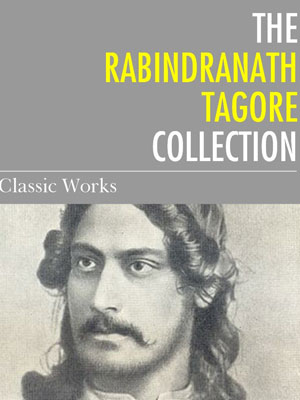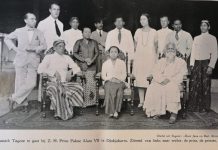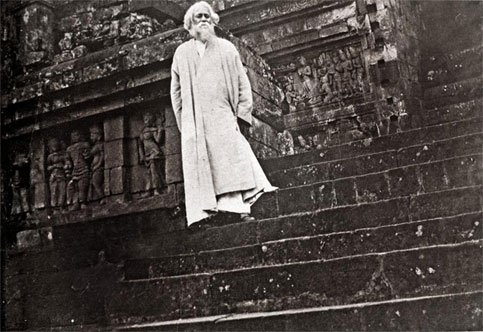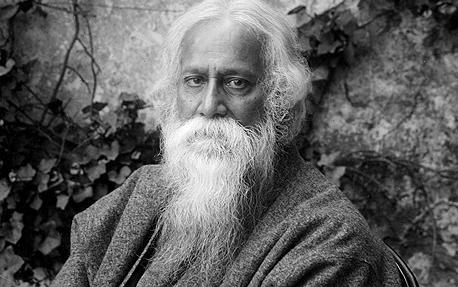 14. Poem No: 8 of the book PATRAPUT written at Santiniketan, ( where the Poet’s University “Visva Bharati” situates) on 5th November 1935.
14. Poem No: 8 of the book PATRAPUT written at Santiniketan, ( where the Poet’s University “Visva Bharati” situates) on 5th November 1935.
Translator’s note: Volumes of philosophical dissertations might not have brought home better the Upanishadic perception of oneness of the trivia with the cosmos than this small poem. A quote from Tagore’s letter written from Sealidah (now in Bangladesh) to Ramendrasunder Trivedi on 29 February 1912 may further explain this concept –
“My heart holds the perception of the life of a tree, which I can confess because I have been a human. But why the tree alone, perception of the entire inanimate world is imbibed there too. All the vibrations of the Universe pass me the thrill of camaraderie“ within my heart, the Anandam (heavenly joy) of the trees and plants mute over ages has found expression- else, when to-day the mango buds are wild on the trees, on whose invitation do I go forward to organize the spring festival! There is an enormous Anandam in me which is within the land, water, trees, birds and beasts here also.
When I have seen through the open window of my boat the sunrays falling on the saffron soil of this ancient earth, my entire body stretches to the remote border of its dust and green there. When at some holy moments my feel is deep that I am integral with all the soil, rock, water and all here, my body and soul delight up in a clear music of an all pervasive existence. This is my nature and not a mere fancy, from which founts my poems, songs and stories. This does not inhibit me. A man I am and so I am everything“ which is my glory“ in my senses the world’s history illuminate, there culminate the existences of all animate and inanimate. That is why the waves of my blood rhyme with the sea’s, but the sea waves don’t know me so, my euphoria delights up combined with the trees’ but they don’t know me; I am not within their subconscious”.
This wild seedling finds way to me,
Yellow and green in her leaves I see,
Flowers are violet, cups wily
To sip light delightfully.
But no answer anywhere
When her name I inquire
She is in the club of the anonymous
Where belong the heavenly stars inglorious.
So, I capture her in my pet name
Piali (*), in my privacy that is her fame.(*)
There, Fuchsia, Marigold and Dahlia golden,
Grace the ceremony of the garden.
But my Piali remains in liberty,
Though in utter ignominy“
Unfettered by distinction of class,
A Boul (**), unsocial, lost in the mass. (**)
But soon the flowers drop and dry
Without clamour or outcry.
Her horoscope“ only a few moments’ combine,
The nectar in her heart a few drops fine.
In a short span of time is her journey done,
While ages engulf flaming petals of the Sun;
Her history noted at the corner of a tiny page
With a tiny quill by the Scribe of all age.
Yet, a massive history it does unfold,
From one page to other one can’t behold.
The centuries in their eternal stream,
Their ups and downs in slow rhythm
That raised and buried many a mountain range,
In oceans and deserts brought seas of change,
Along that Time’s flow eternal,
Advanced this flower’s vision primordial.
In this flower’s transience, this vision primordial
Lives all through fresh, dynamic and eternal.
Its end one is to sight yet,
That formless concept, the un-sketched portrait
Remains eternal in some unseen contemplation
That I try to conceive in my imagination.
In which unseen is held Mankind’s trend,
The future, past and present.
(*) ‘Piala’ in Bengali means ‘Cup’ from which the Poet has coined its feminine ‘Piali’ which also happens to be the name of many a girl/women, not necessarily relating them to a ‘cup’, unlike this flower where its similarity with a ‘cup’ is implied.
(**) Bouls are a sect of people in Bengal, whose concentration is most in the Birbhum district of W. Bengal where the Poet’s University “Visva Bharati” (World University”) situates. Bouls are remarkable for their highly spiritual songs with their “Ektara” (a single stringed musical instrument) played in tune, which is their heritage for generations. Religious liberalism is also a remarkable feature of Boul song. These are notwithstanding the low educational level of the Bouls particularly in their earlier generations when singing and begging was their sole occupation. Bouls songs have profoundly influenced Tagore’s own music known as Ranindra Sangeet (Rabindranath’s songs). In the nineties of the last century Purna Das Boul familiarized the Western world with Boul song by virtue of his performances there including America.





